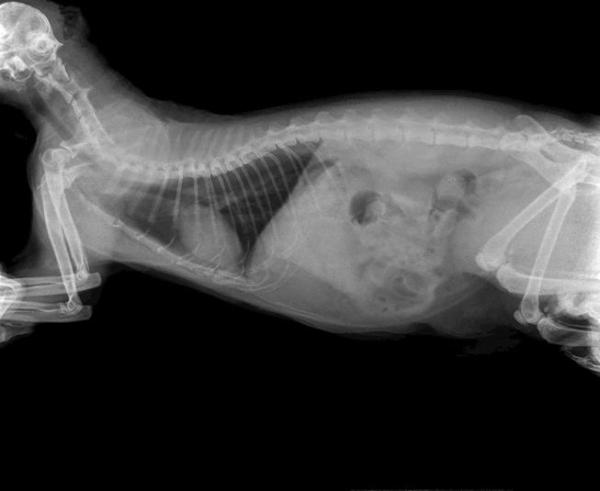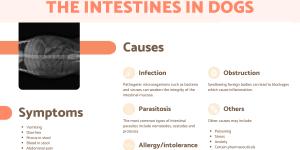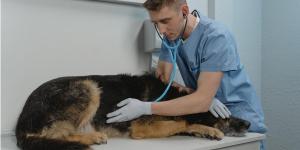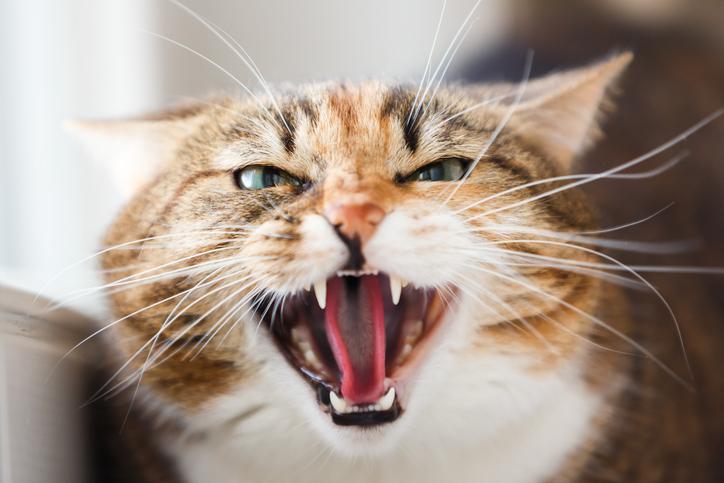Intestinal Blockage in Cats



See files for Cats
Gastrointestinal issues in cats are fairly normal. Many will happily eat various items in their environment, whether inside or out, much of which can lead to problems with digestion. They may feel unwell for a while or even become a little bloated, but it is often nothing to be concerned about. However, when a bowel obstruction in cats occurs, the prognosis may not be as positive. An intestinal blockage in cats means that the digestive process is affected, reducing the ability to absorb nutrients and causing some serious physical discomfort. If left untreated, it can lead to a decrease in their health which may be life threatening.
Intestinal blockages in cats occur when the stomach or intestines are either partially or completely blocked, restricting the flow of both nutrients and waste matter. This can lead to tissue necrosis and is very painful. Unfortunately, bowel obstructions can also be fairly common. This is why AnimalWised helps you look out for the signs and symptoms of this condition to know when the correct treatment will need to be implemented.
Symptoms of intestinal blockage in cats
Cats with bowel obstructions will likely feel very ill, even if the condition progresses slowly. If you have a good relationship with your pet, you should begin to notice signs they are unwell immediately. The symptoms of intestinal blockage in cats to look out for include:
- Vomiting
- Anorexia (cat refuses food)
- Weakness
- Lethargy (extreme fatigue)
- Diarrhea
- Abdominal pain
- Abdominal swelling
- Weightloss
- Dehydration
- Abnormal body temperature
- Electrolyte imbalance (resulting in marked increase in thirst and excessive urination)
- Crying and/or whining
- Lack of willingness to lie down
- Depression
In some cases, due to general distress of the cat, the feline may become uncharacteristically aggressive. This will particularly be the case if you touch them in their abdomen where this area is tender. They may not even be able to tolerate any sort of petting or manipulation due the their frustration. You should not return this aggression with your own anger. It could detrimentally affect the bond you have with your cat even after the recover from their gastrointestinal problems. Instead you need to take them to the vet for diagnosis of the problem.

What causes intestinal blockage in cats?
The principal cause of bowel obstruction in cats is the ingestion of foreign bodies. This could be an item they pick up in their environment and may not even be something we could describe as food. Hairballs are one of the most common obstructions, especially in longhair cat breeds and young cats. You cats may have not yet learned how to groom themselves properly and their lack of experience can lead them to eating things they shouldn't.
Other possible factors which can lead to intestinal blockage include:
- Tumors
- Inflammation of the gastrointestinal tract
- Gastroesophageal intussusception (very rare in cats[1])
- Twisting of intestines
- Polyps
- Overgrowth of stomach tissue
- Pyloric stenosis
Pyloric stenosis is believed to be more common in dogs rather than cats, but cats can certainly experience it as well. The abnormal pyloric outflow inhibits the flow of food to the small intestine and results in obstruction. An endoscopy will likely be needed to confirm diagnosis of this cause[2]. Surgical treatment will likely be needed in many cases, sometimes to remove the blockage itself, but we will look into treatment options below.
Intestinal blockage in cats diagnosis
After a thorough review of the cat's medical history, the vet will look at the symptoms and overall clinical picture. They should also ask you relevant questions related to their diet and whether they have had access to small objects such as eating cords of sewing needles. If you think the cat may have ingested a particular object, you should inform the veterinarian when you present the cat for examination.
A physical examination will be performed alongside a standard set of laboratory tests. This will often include a complete blood count (CBC), blood analysis, urinalysis and an electrolyte panel test. Abdominal palpitation by the veterinarian may notify the vet of the presence of swelling or other intestinal issues such as hardness in the belly or bowel.
Examining the abdomen through the skin is usually not sufficient, so an x-ray or ultrasound will likely be implemented if an intestinal blockage is suspected. However, as we stated above, when it comes to gastrointestinal problems in cats, an endoscopy will likely be performed. When a tumor is suspected, a biopsy may be performed to reach an adequate diagnosis.

Intestinal blockage in cats treatment
Since bowel obstructions in cats are often serious conditions, hospitalization is usually essential[3]. The success of the treatment will depend on the severity of the symptoms as well as the size, location and origin of the blockage.
Stabilization
The cat will likely be affected by extreme dehydration and electrolyte imbalance. For this reason you will need to stabilize the cat before other treatments are administered. Fluids and electrolytes are likely to be given intravenously and, in some cases, plasma may also be given.
Natural treatments for intestinal blockage in cats
If your cat is affected by bowel obstruction, as we said before the problem can exacerbate and become very perilous. If they are exhibiting the symptoms described above, it is imperative you take them to vet and don't try to cure it on your own. If the obstruction is not severe, the veterinarian may try to remove the blockage through laxatives. The vet will likely check the cat regularly for successful expulsion and administer different treatment if symptoms deteriorate.
Linear obstructions such as string or cord may be removed in this way, but an endoscopic removal is more common and effective. However, do not administer this yourself or try to try to remove objects protruding from the cat's rectum. Endoscopic removal is less invasive than surgery, but it can be difficult to guarantee that no object remains. Also, larger objects cannot be removes via this procedure.
Cat intestinal blockage surgery
When attempts to remove the foreign body using an endoscope have not been successful, surgical removal under anaesthesia will be carried out. During this process, the veterinarian will locate the blockage and make a small incision in the intestine or stomach to remove it directly. Once the veterinary surgeon has confirmed all the foreign material has been removed, the incision will be closed with sutures. The cat intestinal blockage surgery cost will vary on the country in which it is performed, the extent of treatment required and the type of insurance of the pet owner.
Recovery from intestinal blockage in cats
If you have a cat which has undergone treatment for intestinal blockage, you will want to know how long it will take to recuperate. When veterinary care is provided in a timely manner, the prognosis for affected cats is generally positive as long as there are no surgical complications. After the surgery, analgesics and antibiotics will be prescribed to relieve pain and combat infection, respectively. The cat will need to spend some time in a veterinary hospital to recover, although the length of stay will depend on the severity of the case.
Once the cat can retain food and fluid, they can return home. You will need to find a comfortable place for the cat's recovery, providing a calm environment away from noise, unsupervised children and other pets. You will have to be careful to prevent the cat from licking its sutures. This can not only re-open the wound, but can lead to infection. An Elizabethan collar is the most common and is effective.
Owners should also closely monitor the cat for signs of dehydration or infection. Only mild foods should be administered during the first few days to avoid irritation. Soft food like that prepared for cats with diarrhea should be a good option.
The sutures should be removed between 7 and 10 days after surgery, with follow up appointments needed to ensure there are no complications to their recovery. Precautions should be taken to ensure the ct does not eat similar objects in the future. This may include the covering of garbage cans or properly stowing away objects such as thread or wool.

Natural remedies for intestinal treatment in cats
As we stated above, it is essential to take a cat to the vet if they show the symptoms of intestinal blockage as described here. There are no natural or home remedies which can remove an obstruction in the bowel and you will be putting your cat's life at risk. The longer you wait to take the cat for treatment, the worse the prognosis will be.
However, if the problem is not a foreign object or is simply constipation, then there are possible ways you can help with prevention and recovery after surgical treatment. There is sufficient evidence to support that natural oils such as fish oil[4] and, potentially, olive oil can be used to help with gastrointestinal diseases such as colitis[5] (inflammatory bowel disease). Given to the cat to relive constipation or to help recovery, they may aid in return the cat's health. You can read about the benefits of oilve oil for cats in our article on the subject, but you should note that further study in the area is needed and long-term effects of supplementary oils have not been fully explored. Be wary of natural remedies such as coconut oil which may complicate the pathological picture due to the high amounts of saturated fat.
This article is purely informative. AnimalWised does not have the authority to prescribe any veterinary treatment or create a diagnosis. We invite you to take your pet to the veterinarian if they are suffering from any condition or pain.
If you want to read similar articles to Intestinal Blockage in Cats, we recommend you visit our Intestinal problems category.








